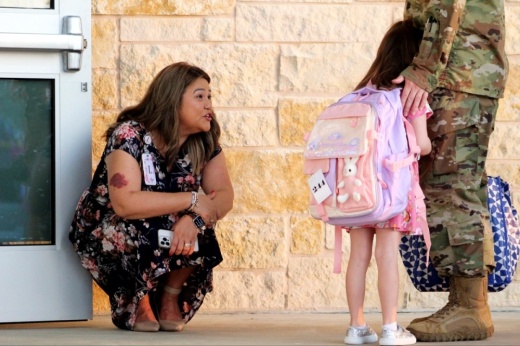Due to budget constraints, SMCISD officials have placed a voter-approval tax rate election, or VATRE, on the November ballot.
“We’re using the current revenue rates that we have, and because we’re doing that, it’s pushing us further into debt. ... We are asking for that tax rate election to occur in order to close the gaps,” said Michael Doyle, SMCISD executive director of business and finance.
What's happening?
The Texas Legislature designated $4 billion for public education funding in the 88th legislative session. The funding failed to pass due to lawmakers tying increases in basic allotment funding to the approval of an educational saving account program, which would have provided public funds to families who enroll their children in private schools, according to previous reporting by Community Impact.
The basic allotment for each student—$6,160—has not changed since 2019, while inflation has increased by 22%, HCISD Superintendent Eric Wright said.
With a $6.2 million shortfall, HCISD officials said it is unsustainable for the district to continue dipping into its fund balance.
SMCISD has been taking steps to cut costs for FY 2024-25 by the board of trustees approving attrition—or not refilling nonessential positions—
a hiring freeze for noninstructional positions among other measures.
SMCISD is expecting a nearly $18 million budget shortfall in FY 2024-25. If the VATRE is approved by voters, the increased tax rate of $1.0152 could help the district receive an additional $2.7 million-$2.8 million in funding every year.
The impact
Gov. Greg Abbott said there are several reasons why schools are facing budget shortfalls.
“One is that public schools received extraordinary funding from the federal government for COVID recovery, and that federal funding is no longer available,” Abbot said in a letter to Texas House Democrats, also stating that he cares about improving public schools, but the school choice program needs to pass to secure the funding.
“If the governor doesn’t release the hostages as I call [them]—the dollars—then we would be forced to have committee meetings and decide which programs or which staff might be asked to [be] repurposed or removed,” Wright said.
SMCISD Chief of Communications Andrew Fernandez said officials are trying to find a solution that does not impact one department or program.
“I don’t think there’s any one program and one department where we’re like, ‘This is going to be cut next year.’ It’s more of a holistic approach,” Fernandez said. “How can we cut a little bit here and there so that no one feels a big impact?”
What the experts say
Bob Popinski, senior director of policy for Raise Your Hand Texas, said districts across the state are seeing stagnant or declining enrollment numbers, causing them to have to make tough choices.
“In some instances it’s, ‘Hey, we’re [going to] have to close some schools, we’re [going to] have to cut back on programs that we know are beneficial to our kids,’” Popinski said.
Also of note
In both SMCISD and HCISD, special education enrollment has been increasing over the years.
“We are not alone as far as public school districts [in] seeing an increase in the percent of students who are receiving [special education] services, but the state is not relinquishing or changing how they calculate [special education] funding,” Doyle said.
In response, HCISD has made cuts to their departmental budgets, causing department heads to make more choices as to how they spend their money.
Doyle said SMCISD is having to pull funding from other places to support special education students due to underfunding from the state.
“Like pretty much every other school district in the state, we’re underfunded in [special education], and so we have to make up for that gap because we are going to serve our students,” Doyle said. “They deserve the service, and we’re going to make sure that they have the best learning environment possible.”
Looking ahead
Popinski said the Texas Legislature will begin debating in January, but will not pass a state budget until May of 2025.
“School districts are going to be stuck with a lot of hard decisions,” he said.
Doyle said public school districts are not seeing support on the federal level, either, and there will be a tight window for the federal legislature to approve any future funding. SMCISD received and maximized Elementary and Secondary School Emergency Relief, or ESSER grants one, two, and three—with ESSER three ending this year.
Wright said he hopes that the state legislature will have “some common sense” and come up with some sort of compromise to fully fund traditional public schools.
“I know that the governor has to get a victory, so I hope it’s just a small victory and doesn’t cripple our system,” Wright said.






